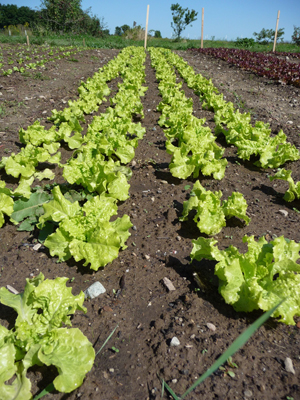Moving From Conscious Consumer to Engaged Citizen
Author: Oran B. Hesterman, PhD
Part 1 of a series of blogs based on the book:
Fair Food: Growing a Healthy, Sustainable Food System for All.
A Broken Food System
Our food system is failing many of us. Originally designed to produce abundant food at low cost, it now destroys some of what we hold most precious—our environment, our health, and our future.
While many of us have become more conscious about the impacts of our personal food choices, we can’t fix the broken food system simply by changing what’s on our plate. The answer lies beyond the kitchen: it relies on our willingness to be fair food “solutionaries” in our communities, in the institutions where we work, and with policy makers.
Beyond Your Kitchen
This is a moment when you can make a difference if you harness your voice, beliefs, passion, and resources to promote a fair and healthy food system. If you are ready to participate in creating a fair food future beyond your own kitchen, one place to start is in your community.
- Instead of using just your personal purchasing power to fill your own fridge, you can help create a community buying club so that your friends and others in the community can combine their food purchasing efforts and support a fairer food system.
- Instead of growing a vegetable garden in your back yard, consider participating in or supporting a community garden so more people in the community have access to land, water, and shared information.
- And instead of focusing on how you can directly access great food at farmers’ markets, consider supporting efforts that assist those in historically underserved communities to obtain greater access to fresh fruits and vegetables.
Shifting Institutional Purchasing
Making changes in our homes, neighborhoods, and communities is a great start for bringing more balance back into our food system, but we can’t ignore that nearly one-half of the dollars flowing through the system is for food eaten outside of the home. If we help shift the flow of food purchasing dollars at some of the major institutions that touch our lives, such as public schools, college and company cafeterias, and hospitals, we can start to see the outline of a redesigned food-system.
- We can join with other concerned individuals to demand different food at our children’s school cafeteria and at our college food service.
- We can advocate for healthier food choices in health care institutions and seek to transform the way food is sourced throughout the institutional system to promote more sustainable agricultural practices.
Policy Change
As we shift our own food purchasing habits and work to create balance within our institutions, we also need our policy makers and industry leaders to work toward a redesigned food system. The food system we have in place is one that was shaped by decades of public policy. We now need policies that will drive the system in a different, more positive direction.
 There are many opportunities for advocating for policy change in our own communities, in our states, and in Congress. We can:
There are many opportunities for advocating for policy change in our own communities, in our states, and in Congress. We can:
- initiate a food policy council in our city or region
- become involved in farmland preservation in our local community, and
- urge our local government to use its powers to direct public resources to support more local, regional, and sustainable farms and food businesses.
But even with all these efforts, we will be able to alter this broken system only when we shift the rules by which the game is played—and many of the rules that set the stage for the current system are written into the federal Farm Bill. The Farm Bill is important because it establishes national goals and priorities for farming, conservation, nutrition, and rural development. It is also important because it represents significant government expenditures, about $300 billion over the five-year life of the bill.
You can make an impact by knowing when the Farm Bill is up for reauthorization, contacting your government representatives, and asking them to support policies that promote a more sustainable and equitable food system. Our website at www.fairfoodnetwork.org can keep you updated with information about timing of the Farm Bill and specific provisions to support.
When all of us committed to making a difference in our food system stand up and make our voices heard, there will be a resounding roar throughout our country: we will be heard, and changes will be made. Now is the time to become a fair food solutionary and to work with a large and diverse cadre of others of all ages and all backgrounds to make the redesigned food system a reality.








